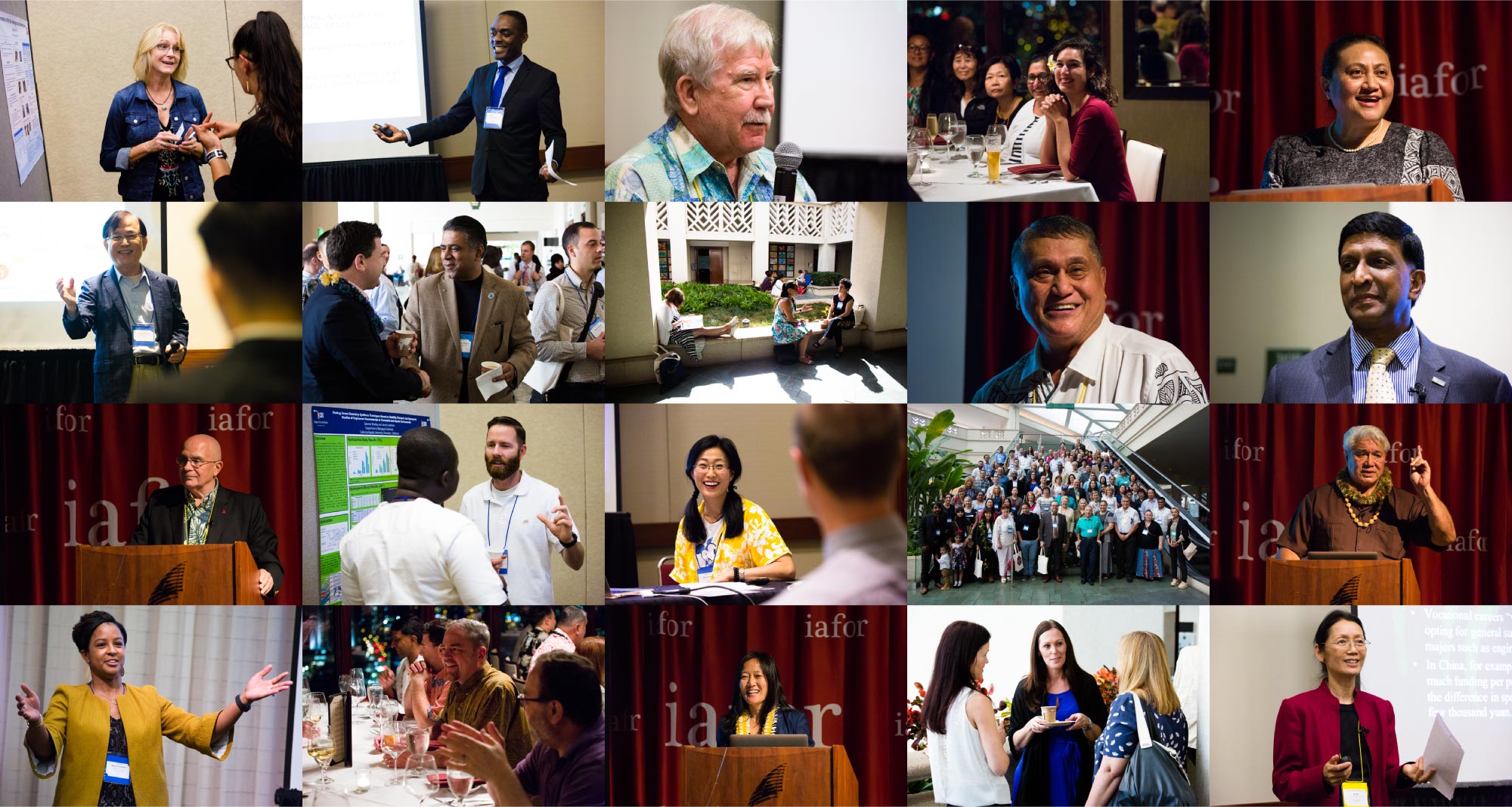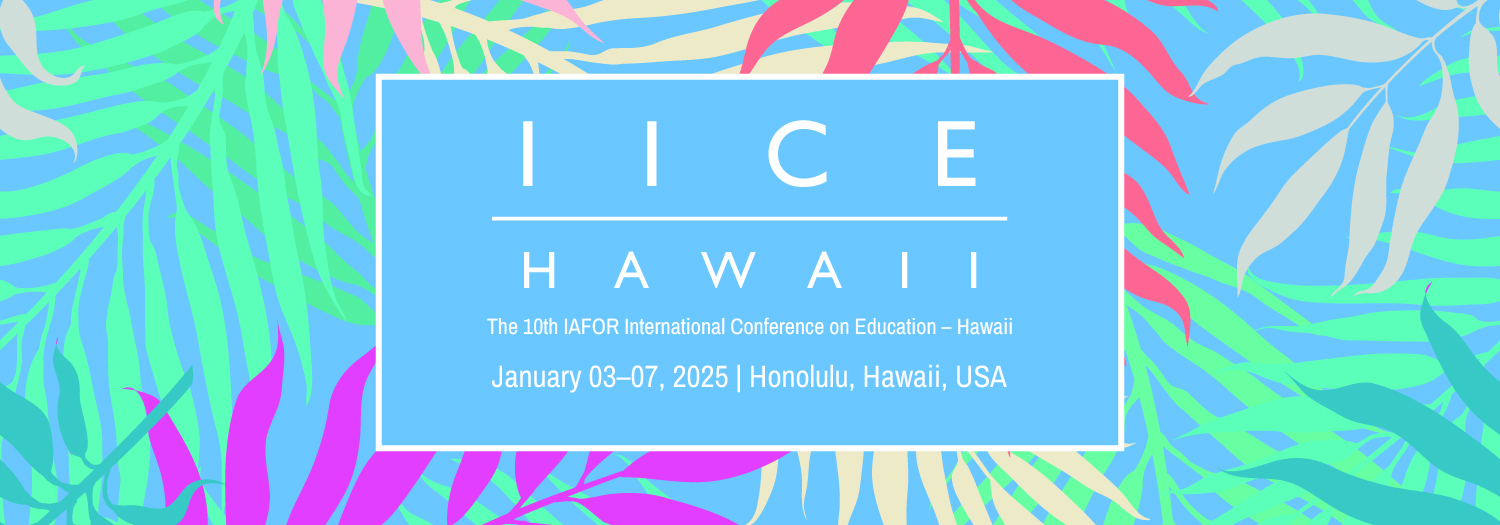
Photographs of The IAFOR International Conference on Education – Hawaii in Honolulu, Hawaii, USA
The IAFOR International Conference on Education in Hawaii (IICE) brings together delegates from many different national, cultural and linguistic backgrounds to Honolulu, Hawaii, to present new research and exchange ideas. This exceptional platform welcomes speakers and delegates working in any area of education, from academics and theorists to policymakers and practitioners, in both the private and public sectors, for challenging debate and stimulating discussions around the latest concepts and newest approaches.
Held across four continents, IAFOR’s education conferences attract more than 2,000 delegates a year from more than 80 countries. Education as an (inter)discipline drives the purpose of the forum by bringing alive the notions of the international, the intercultural and the interdisciplinary through scholarly, political, and personal encounters with some of the most important academics and practitioners working in the field, as well as the thought leaders of tomorrow.
IAFOR's education conferences are organised in partnership with some of the world’s most prestigious universities and schools of education, including Birkbeck, University of London, UK; University of Sussex, UK; University of Indonesia, Indonesia; and University of Utah, United States.
Our conferences have included Featured Presentations by educators and academics, university presidents, government ministers, journalists, and policy makers, as well as academic fora around some of the pressing issues in the fields of education.
We invite you to use the IAFOR platform to share and test your ideas with scholars around the world, and to join us very soon at one of our education conferences.
The IAFOR International Conference on Education in Hawaii (IICE) is a multidisciplinary conference held concurrently with The IAFOR International Conference on Arts & Humanities in Hawaii (IICAH). Keynote, Featured and Spotlight Speakers will provide a variety of perspectives from different academic and professional backgrounds.
Registration for either of these conferences permits attendance in both.
About IAFOR’s Conferences on Education
The International Academic Forum (IAFOR) promotes and facilitates new multifaceted approaches to one of the core issues of our time, namely globalisation and its many forms of growth and expansion. Awareness of how it cuts across the world of education, and its subsequent impact on societies, institutions and individuals, is a driving force in educational policies and practices across the globe. IAFOR’s conferences on education have these issues at their core. The conferences present those taking part with three unique dimensions of experience, encouraging interdisciplinary discussion, facilitating heightened intercultural awareness and promoting international exchange. In short, IAFOR’s conferences on education are about change, transformation and social justice. As IAFOR’s previous conferences on education have shown, education has the power to transform and change whilst it is also continuously transformed and changed.
Globalised education systems are becoming increasing socially, ethnically and culturally diverse. However, education is often defined through discourses embedded in Western paradigms as globalised education systems become increasingly determined by dominant knowledge economies. Policies, practices and ideologies of education help define and determine ways in which social justice is perceived and acted out. What counts as "education" and as "knowledge" can appear uncontestable but is in fact both contestable and partial. Discourses of learning and teaching regulate and normalise gendered and classed, racialised and ethnicised understandings of what learning is and who counts as a learner.
In many educational settings and contexts throughout the world, there remains an assumption that teachers are the possessors of knowledge which is to be imparted to students, and that this happens in neutral, impartial and objective ways. However, learning is about making meaning, and learners can experience the same teaching in very different ways. Students (as well as teachers) are part of complex social, cultural, political, ideological and personal circumstances, and current experiences of learning will depend in part on previous ones, as well as on age, gender, social class, culture, ethnicity, varying abilities and more.
IAFOR has several annual conferences on education, exploring common themes in different ways to develop a shared research agenda that develops interdisciplinary discussion, heightens intercultural awareness and promotes international exchange.
Previous Speakers
The speakers below, among others, have presented their research at IAFOR's conferences on education.
Sue Jackson, Pro-Vice Master (Vice President) for Teaching and Learning at Birkbeck, University of London, UK, and IAFOR International Director of Programme for Education; Rosemary Deem, OBE, Vice Principal for Education and Dean of the Doctoral School at Royal Holloway, University of London, UK; education and technology expert Eiko Otani, President of Osaka Jogakuin University, Japan; Barbara Lockee, Associate Director of the School of Outreach at Virginia Tech, USA; Frieda Mangunsong, Professor at the University of Indonesia; Mary Stuart, Vice Chancellor of the University of Lincoln, UK; Svetlana Ter-Minasova, Founding Dean and now President of Moscow State University’s School of Foreign Languages, Russia; Akito Arima, former Japanese Minister of Education and President of Tokyo University; Mona Abo-Zena, early childhood development expert of Brown University, USA.
Other IAFOR Conferences in Education
- The Asian Conference on Education (ACE)
- The European Conference on Education (ECE)
- The Asian Conference on Education & International Development (ACEID)
- The IAFOR Conference on Educational Research & Innovation (ERI2023)
- The Barcelona Conference on Education (BCE)
- The Southeast Asian Conference on Education (SEACE)
Ways to Get Involved
IAFOR depends on the assistance of a large number of international academics and practitioners who contribute in a variety of ways to our shared mission of promoting international exchange, facilitating intercultural awareness, encouraging interdisciplinary discussion and generating and sharing new knowledge. We are grateful for the time, effort and expertise donated by all our volunteer contributors.
Here are some of the ways you can get involved:
If you have any questions, or if you would like to suggest additional ways in which you could contribute to IAFOR’s interdisciplinary activities, please feel free to email iicehawaii@iafor.org.
